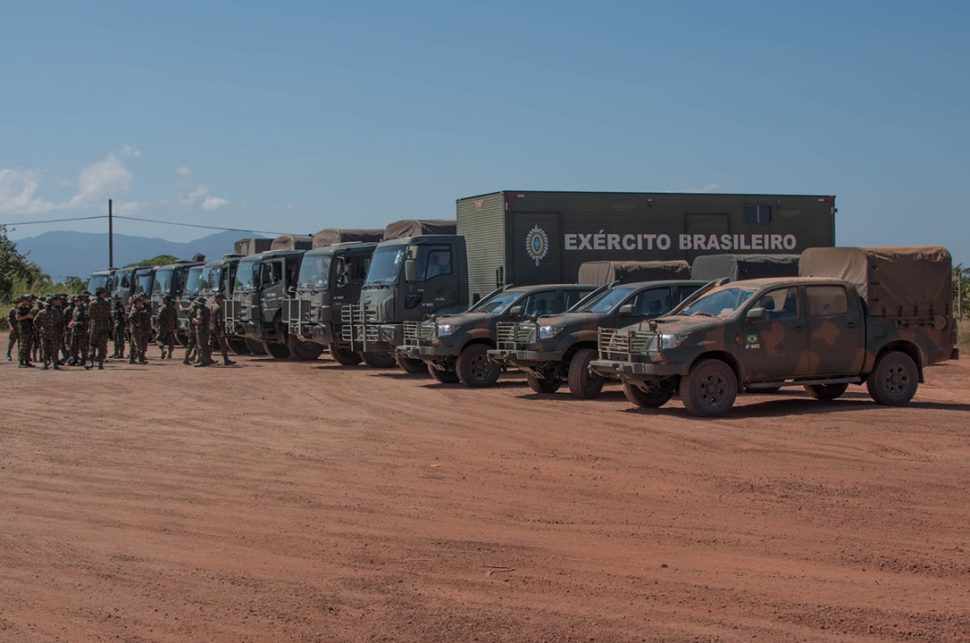The drilling of eight wells in eight villages in the South Rupununi, in Region Nine, by the Brazilian Army under its 6th Battalion Engineering Corps is expected to begin today and authorities say it has both the potential to offer unprecedented relief to the residents and the transfer of knowledge in the techniques that will be used.
State Minister Joseph Harmon was among those who spoke of the potential benefits of the operation when he addressed a welcoming ceremony that was held at the Lethem Amerindian Hostel for the Brazilian team on Monday.
Harmon, according to a Ministry of the Presidency statement, noted the importance of knowledge transfer and capacity building of Guyanese in the area of well drilling techniques. He said soon Guyana will be in a better position to drill its own wells, not only at the technical level but more importantly, at the community level. “This is significant because our community members are the first responders and this project is an excellent model of inter-agency collaboration which is a demonstration of an efficient Government,” the minister expressed.
The drilling of the artesian wells is to take place in the villages of Aishalton, Chukrikednau, Shea, Maruranawa, Awar-uwaunau, Karaudarnau, Achiwib and Bashraidrun.
The statement noted that the Brazilian Military Attaché at the Brazilian Embassy in Georgetown, Colonel Emmerson Deni, explained that during the drilling phase there will be technology transfer and capacity building, which will benefit several agencies, including the Guyana Defence Force (GDF), the Guyana Water Incorpor-ated (GWI), the Hydro-meteorological Office (HydroMet), the Ministry of Public Infrastructure as well as representatives from the eight villages.
Drilling is expected to start at Aishalton and Karaudarnau. The Guyanese team will be drilling the last two wells under the supervision of the Brazilians.
Meanwhile, according to the Ministry of the Presidency statement, Lieutenant Colonel Kester Craig, Director-General of the Civil Defence Com-mission (CDC), which is the coordinating agency, said Guyana has embraced the concept of comprehensive disaster risk management, with the central focus being to place greater emphasis on the impacts of climate change, to incorporate more prevention and mitigation measures and to inculcate its components into the national risk management agenda.
“This project apart from providing potable water to residents is an effective risk reduction initiative aimed at minimising the effects of droughts as experienced annually in the targeted communities,” Craig was quoted as saying.
Regional Chairman Bryan Allicock also said the digging of the wells would result in tremendous relief being given to the residents, who have suffered due to the effects of El Niño.
“We are very, very happy that our neighbours have put a lending hand and not just drilling wells but also passing on the knowledge. We must thank the Brazilians in honouring this request for this region because our farmers and ranchers suffer every year during the dry season,” he stated.
Additionally, Lethem Mayor Kerry Jarvis stressed the need to implement sustainable mechanisms, which can address the situation of droughts in the region. “Water is life and while we are the land of many waters, there is still a difficulty in accessing this resource at different times in different areas.
There is a need to have water to sustain our farmlands during the dry weather since not all farms are located next to rivers. We not only have to think about the farms but persons who rear cattle since these animals need to have access to water. When I heard about this project, I was pleased to be part of the initiative.
This shows that our ties and collaborative efforts are being strengthened. The Town Council is grateful and pledges our support,” Jarvis stated.
The ministry said it is the intention of the Brazilian team to have the wells handed over to the Guyanese authorities on November 28th, 2018.
The project follows President David Granger’s State visit to Brazil in December 2017, where the Complementary Agree-ment to the Basic Agreement on Technical Cooperation between Guyana and Brazil for the Implementation of the Project Technologies to Reduce the Effects of the Drought in Region Nine was inked.
The Complementary Agreement states that the Government of Brazil shall undertake to “promote the transfer of Brazilian knowledge and experience related to mitigation of the effects of drought; provide the means for implementation of activities foreseen in the Project, send consultants and experts to implement activities to be carried out in Guyana, support the development of the Guyanese technical team’s capacity to drill artesian wells and monitor and evaluate Project implementation.”
Meanwhile, the Govern-ment of Guyana, as prescribed in the Agree-ment, shall undertake to “take responsibility for the maintenance of the artesian wells that will be drilled during the practical operations on the ground; appoint a technical team to monitor and participate in activities to be implemented, provide the technical team sent by the Govern-ment of Federative Republic of Brazil with the logistical support required to implement activities of their responsibility and to take measures to ensure that activities implemented by professionals sent by the Brazilian Government will be continued by professionals from the Guyanese implementing institution.”






